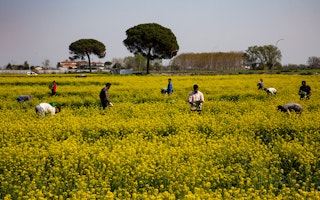In a Postfact World, German Journalists Welcome a Trove of Migration Data
By Rana Göroglu

Journalists have a difficult job. Increasingly, they’re being asked to produce a high volume of content in a shrinking amount of time, preventing them from digging deeply into complex issues like migration. Despite this, in Germany, one of the countries hosting the most migrants entering Europe, the media has performed respectably—even tabloids have largely maintained a fact-based approach to their coverage. This bucks the trend we’ve seen in other European countries. Our organization, Mediendienst-Integration [site in German], is working hard to ensure the German media keeps their standards high.
Mediendienst-Integration launched in 2012 when an association of academics, Rat für Migration (Council for Migration), saw a need for fact-based information on migration in Germany. The association decided to initiate a media service organization to provide facts, figures, and science-based information on the topic of migration and integration for the German media.
Our aim is to facilitate journalists’ work by providing them with information they can readily use. We compile data from scientific research, surveys, polls, and quantitative analyses. Any facts and figures relevant to issues related to migration—refugees, asylum, xenophobia, discrimination—fall under the umbrella of data we aim to collect. We also provide critical analysis of statistics, helping journalists decipher the data. This is a crucial part of our job: facts and figures can easily be misinterpreted, especially if one fails to contextualize them. We also publish fact-checks, our own research and interviews, commentary, and scientific overviews that are provided by academics and other experts.
For instance, using our website, a journalist writing an article on citizenship can access a database of verified facts and figures, and search for the specific information they’re seeking—say, the number of citizenship applications received by Germany last year. If they would like to supplement their research with an interview, they can contact us through the website and we will provide them with a list of experts. We also organize press tours and roundtables on migration issues in several locations around Germany, offering journalists face-to-face interaction with various experts, academics, and NGO workers.
Our work has had a noticeable impact on the media discourse in Germany. We’ve seen a steady rise in the number of journalists accessing our online content and submitting queries. We’ve also witnessed the impact in qualitative terms: Mediendienst-Integration has become a household name for broadcast news producers and newspaper editors, both of whom contact us regularly and make repeated use of the experts we’ve made available.
Right-wing populists have coined the term lügenpresse, or “lying media,” as a derogatory term for fact-based journalism. They frequently accuse the media of hiding or misrepresenting the truth. The recent political successes of right-wing populists in Germany underline the importance of communicating academic findings, facts, and alternative points of views to the public through media outlets.
Furthermore, migration, and the political decision making around it, is an international—and especially European—phenomenon. The questions debated in Germany are also discussed in our neighboring countries. With this in mind, we believe it is essential to network and exchange information with non-German organizations that take a similar approach. With populism rising across Europe, having an open, informed, and fact-based public and media discourse, especially about migration, is more important than ever.
Mediendienst-Integration is a grantee of the Open Society Foundations.
Rana Göroglu is managing director at Mediendienst-Integration.


